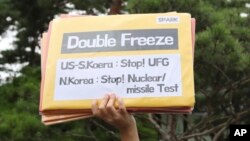The U.S. and South Korea on Monday began 10 days of large-scale joint military exercises, but with a reduced number of troops and assets than had participated last year.
Military leaders stress these defensive drills are needed to maintain operational readiness, but there are concerns that a show of force could again aggravate tensions in the region, after the U.S. and North Korea recently came to the brink of conflict over a possible missile test targeting the Guam region.
War games
The Ulchi Freedom Guardian exercises that occur every summer are a massive military planning and coordination operation about how to respond to computer-simulated North Korean attack scenarios. Some 17,500 American troops will participate, down from 25,000 last year along with 50,000 South Koreans.
These annual war games, in addition to the combined ground, air, naval field exercise that occur in the Spring, are needed, say military leaders, to train the constant influx of new soldiers being deployed in the field.
“What we are talking about here is warfare. It’s not practicing for a parade, so you have to constantly be updated,” said military analyst Grant Newsham with the Japan Forum For Strategic Studies in Tokyo.
De-escalation
But this year’s exercises come just as North Korean leader Kim Jong Un actually de-escalated tensions by putting put on hold a plan to fire intermediate range ballistic missiles toward waters near the U.S. territory of Guam.
The move averted a possible conflict after U.S. President Donald Trump warned that the U.S. military was “locked and loaded” and would respond to any attack with “fire and fury.”
Some political analysts suggest Washington seems to have responded to Pyongyang’s recent restraint by downsizing this year’s exercises, sending less personnel, and holding back nuclear capable bombers and other strategic assets.
“One way to send a reconciliatory gesture to North Korea is that we are not going to bring any strategic assets like B-1s, F-35s or nuclear powered submarines,” said political analyst Choi Kang with the Asan Institute in Seoul.
Fuel to the fire
However, on Sunday Defense Secretary Jim Mattis denied that North Korea’s objections factored into the reduced number of troops and assets in this year’s war games.
"No, no, this is an exercise for the defense of Korea. It's a combined exercise and it's all worked out way in advance by the alliance officers.” said Defense Secretary Mattis.
North Korea said Sunday that the military exercises “add fuel to the fire” increasing the likelihood that Pyongyang will conduct further missile and nuclear tests in the future.
North Korea has long objected to the U.S., South Korea joint military exercises that they have called “rehearsals for invasion.” Last year’s war games included planning military strikes to kill the leadership in Pyongyang.
“The word that came out last year was decapitation because we were being threatened by North Korea having done nuclear tests and missiles, so we took those two events very seriously,” said the Asan Institute’s Choi.
South Korean President Moon Jae-in said Monday the joint drills are defensive in nature and not intended to raise tensions on the peninsula. He also cautioned North Korea to “not exaggerate our efforts to keep peace” nor to use the exercises as an excuse to engage in provocations.
China and Russia have also called for the suspension of the joint military drills along with a freeze on North Korean missile and nuclear tests.
Youmi Kim contributed to this report






